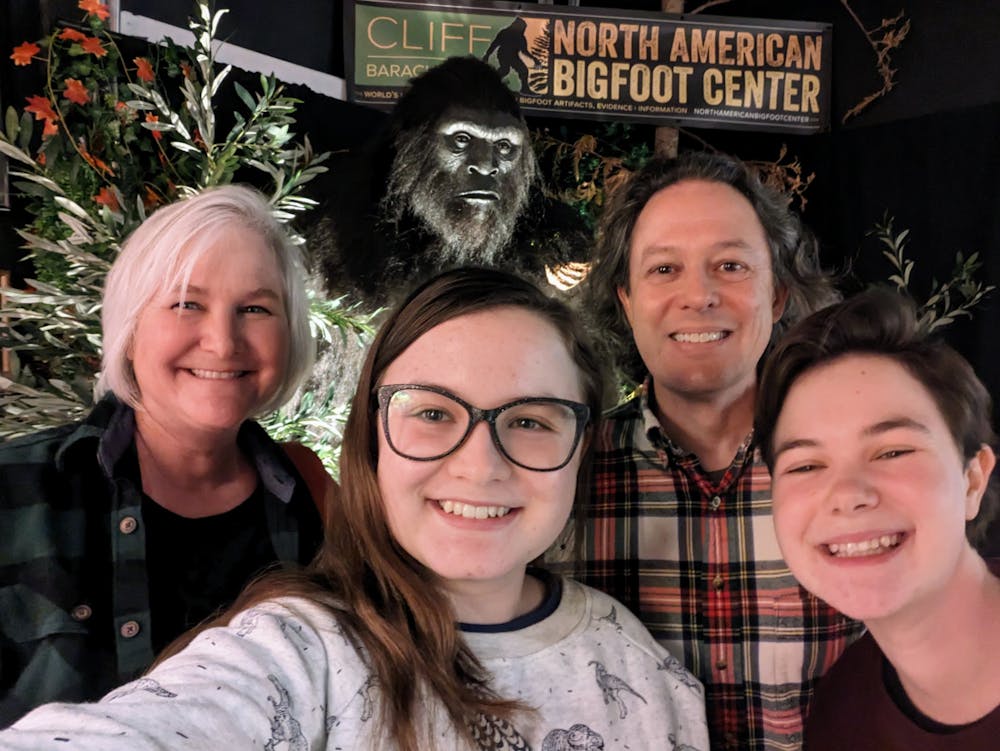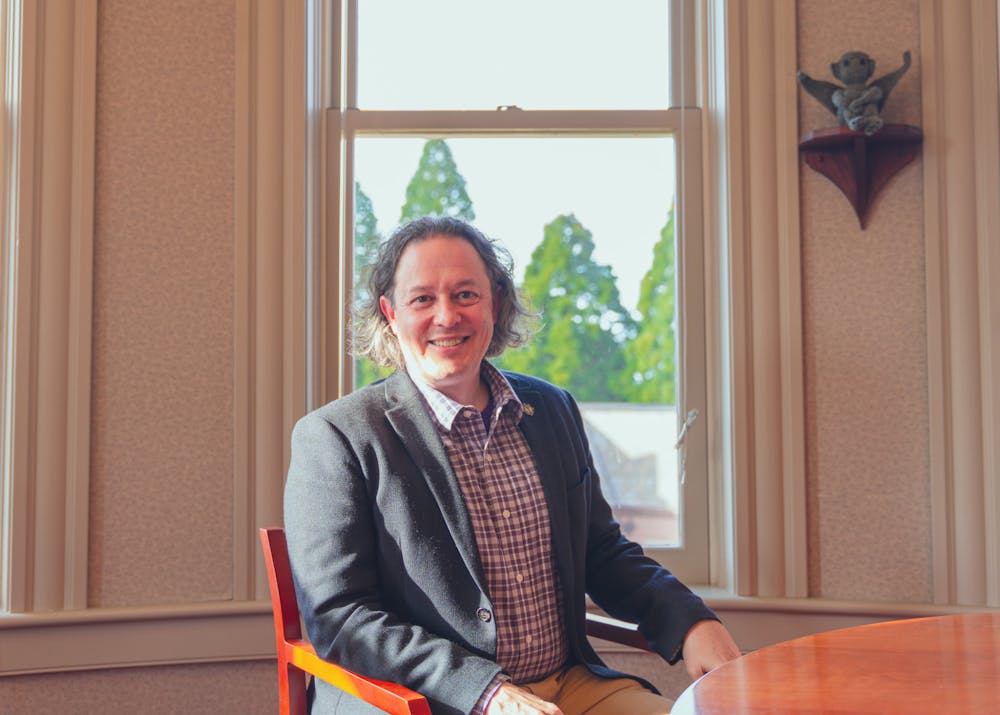Walking into Provost David Mengel’s Waldschmidt office, one is soon greeted by a suit of armor called “Sir Robin.” According to Mengel, Sir Robin is named after a Monty Python character and was gifted to him by his wife after she discovered him in a junk shop.
Smartly dressed in a purple bowtie and scarf, it simultaneously displays Mengel’s sense of humor and his passion for medieval history.

Mengel is the provost and a professor of history at the University of Portland. Since 2023, Mengel has called the Bluff his home. But his life has been painted by the people and places of his past. Coming from Xavier University where he served as dean of their College of Arts and Sciences, Mengel is no stranger to the many challenges higher education is currently facing.
“I don’t know any professors who get [their] doctorates in order to become administrators,” Mengel said. “And I didn’t either.”
Born in Orlando, Florida and raised in a non-Catholic Christian home, Mengel has found intellectual freedom in the setting of Catholic universities.
“The questions I was asking as a college student … are very much questions that I now recognize as the questions of the Catholic intellectual tradition,” Mengel said. “Namely, ‘How do we know what we know? What might we learn through faith? What might we learn through reason?’ And then, this really interesting question to me, ‘How do those come together?’”
His academic journey began at Vanderbilt University, where he graduated with a degree in English. It was there that he took a course that sparked his love for medieval studies. This led to him applying for the Marshall Scholarship his senior year to pursue that topic more deeply at Cambridge University.

After earning a master's degree in Church history at Cambridge University on the Marshall Scholarship, he pursued a PhD in medieval studies from the University of Notre Dame. He took three years of classes at Notre Dame and then spent a year in Prague on a Fulbright Scholarship. This was then followed by a year of study in Germany before another three years at Notre Dame to write his dissertation, according to Mengel.
“I’ve always been curious about a lot of different things,” Mengel said. “In some ways, my story is very simple. I had a lot of different interests and a college professor’s passion, and great teaching helped me to focus on some particular things.”
After earning his PhD, Mengel was hired as an assistant professor of history at Xavier University — a Catholic university in Cincinnati, Ohio. He would go on to spend the next 20 years of his career there taking on various roles.
“I had recently gotten tenure and got involved in a group that was planning to establish a Center for teaching and learning, and the next thing I knew I was recruited to be the first faculty director of that center,” Mengel said.
After spending two years as the faculty director, Janice B. Walker, then dean of the College of Arts and Sciences at Xavier, asked him to become an associate dean for the college.
“He’s one of the most exceptional people, not just administrators, that I know,” Walker said. “It was always a relief [and] pleasure to work with him … It didn’t matter what I asked [of him]. I would get it and it would come back far better than I could have imagined.”
Mengel would go on to succeed Walker in her position as dean of the college. It was in this position that he would understand what made the job of being an administrator so impactful.
“I can say that every week there are some decisions and some actions that I can be a part of that I can see how they benefit the students, the faculty, the staff or some combination of them in a way that I think is important for the good of the whole community,” Mengel said.
Jen Droege, the assistant dean for Xavier’s College of Arts and Sciences, worked with Mengel during his time as dean.
“The first thing that stands out to you about him is just how engaging he is,” Droege said. “You get the sense that he’s genuinely interested in what you have to say … I think sometimes there’s this perception of administrators as being a little stuffy … and Dr. Mengel is very down to earth. [He] always had his door open.”

Any sense of administrative stuffiness is dispelled after a visit to Mengel’s office. Conversations with him are vibrant and filled with a myriad of topics. One topic that Mengel happily spoke on was how he and his wife, Emily, met.
Grade school is filled with the hallmark experiences of reading comprehension checks, basic arithmetic and learning how to share. It was also here that he would meet Emily.
“We met in the second grade,” Mengel said. “We started dating right as we were graduating from high school, but we were good friends for a long time. We didn’t start at the same college but we ended at the same college, and we actually then married right before going to Cambridge.”
Mengel and his wife have two children, one who is currently in university and another who just recently graduated. Moving to Portland from Cincinnati presented Mengel with the opportunity to delve into the rich outdoor activities of the Pacific Northwest.

“I love the outdoors.” Mengel said. “One of the things that was really attractive about the Pacific Northwest was easy access to hiking. I haven’t yet got my kayak on the water here, but when it gets just a little warmer and I have a little more time I’ll get the kayak out.”
Traveling has also been a frequent hobby of Mengel and his wife— just one of the perks of being a medieval historian, according to Mengel.
When he isn’t spending time with his family or outdoors, Mengel can be found keeping Sir Robin company in his office at Waldschmidt. His role as provost requires him to dedicate his time on campus to his numerous responsibilities.
The role is not always an easy one. At a time when skepticism regarding the value of higher education is at a fever pitch, student loan debts loom over educational journeys and controversy embroils the nations top universities, guiding a campus community through the challenges of today is no small task.
“This is a moment in higher education where the paths forward are not fully charted,” Mengel said. “Universities reflect the societies and the challenges of societies, and the University of Portland, like every other university, has adapted over time. We’re at a time of adaptation, and it’s really important that we adapt well.”
Tamara Herdener, the associate vice president for student development and the dean of students, appreciates Mengel’s curiosity regarding the perspectives of everyone who may be impacted by administrative decisions.
“What I’m so thankful for is his genuine holistic care for students,” Herdener said. “He’s always the one to say, ‘Have we heard from the students? Have we heard from the faculty? Have we heard from the staff? What do people think about this?’”
Recently, Mengel found himself in the center of a controversial anti-abortion event on campus, which he moderated.
“I’m convinced [that] even the hardest issues … we can walk through together,” Mengel said. “I was really tremendously proud of our students who [were] sitting in an energy-filled room with really strong convictions that were not aligned all with one another. [They] found ways to express their beliefs, their convictions, their questions [and] sometimes their anger.”
For Mengel, the environment of a university must be conducive to cultivating academic freedom and healthy conversations. It is a time where uncomfortable topics are given the space they need to be discussed.
“I’m not the same person in a lot of ways as I was as a 17 year old,” Mengel said. “And some of those changes [and] some of the ways I became a different person happened in a university setting.”
In his role as provost, Mengel is hopeful that the UP community is up for the challenges which the current moment presents universities across the nation.
“I have a responsibility to do what I can [to make] this a place where we’re committed to learning, where we’re committed to our community [and] where we’re preparing our students to do what we see too little of in our society,” Mengel said.
Noah Carandanis is the Living Editor for The Beacon. He can be reached at carandan26@up.edu.









